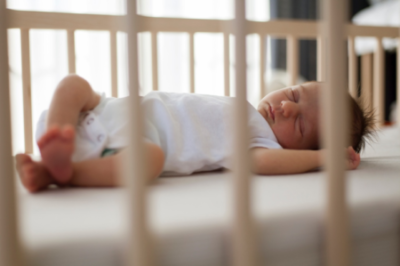Room Alone
Room Alone
Having a baby sleep in a separate room increases the risk of Sudden Infant Death Syndrome (SIDS) and makes it more difficult to respond quickly to their needs.

Official guidelines tell parents to keep babies in the parent(s) room until they are 6 months old. This is because the risk of SIDS (cot death) is greater for babies who sleep on their own compared to sleeping in the presence of an adult.
- The largest UK study (CESDI) ( Babies sleeping with parents: case-control study of factors influencing the risk of the sudden infant death syndrome. Blair et al, 1999.) found that out of 321 babies whose death was classified as SIDS, 114 died when they were alone in a room, compared to 81 who were room-sharing.
Despite this advice some parents have their baby sleep in its own room from birth because they have prepared a room for the baby, and others move their baby to a separate room at around 3 months of age (babies are most at risk of SIDS at 2-3 months of age).
Sometimes this is because there is no room for a cot/crib in the parents’ room when a baby outgrows a Moses basket. Other times it is because the baby is preventing one or both parents from sleeping.
There are other options you could consider:
- If there is no room for the baby’s cot in your room, could you fit a single bed in the baby’s room where a parent could sleep near to the baby?
- If the baby is disturbing one parent who needs to be alert for work, could that parent sleep in a separate room for a few months instead of the baby?
Newborn babies wake frequently and need feeding and attention at night for several months. If a baby is in a separate room it can be difficult to know when it wakes or needs attention. Baby monitors allow you to hear your baby, but many models don’t allow the baby to hear you and know that you are nearby.
Often-times babies are put in a separate room to sleep during the daytime, which is also associated with greater SIDS. Keep your baby in the presence of an adult caregiver when they are sleeping, day and night. It may be helpful to have a portable sleep space downstairs, and a cot in the bedroom. Remember that babies should lie flat to sleep — car seats and other baby seats are not suitable for prolonged sleep periods because they promote a slumped sleeping position that can affect a baby’s ability to get air into their lungs.
In order to get their parents’ attention babies who are in a separate room may have to cry loudly and it can take a long time to calm them down enough to feed or to return to sleep. While self-soothing is something babies can start to do when they are older, young babies may not be ready to self soothe, or to sleep for long periods, and there is a lack of evidence about the harms or benefits of sleep training regimes that involve leaving babies alone to cry.
More about normal infant sleep patterns can be found here.
For more information about lone sleeping, click here.
